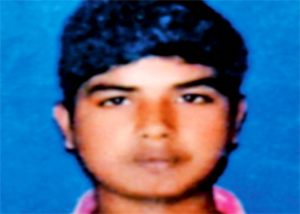Muzaffarnagar, Jul 22: Police have arrested three persons of a Hindu family for killing their 14-year-old Muslim neighbour and burying him in the backyard of their house after a 15-year-old female member of their family fell in love with him, here in Uttar Pradesh.

On Thursday, in what sent shock waves through Muzaffarnagar, the police dug out the body of Irshad, the school-going teenager, from the compound of the Sainis. According to police the family members of the girl kidnapped the boy, killed and buried him quietly. Two brothers of the girl and an uncle have been arrested in connection with the case.
Shakeel Ahmad had filed a missing person report at Jansath police station on Tuesday after his son didn't return home even by late evening. The boy had never done that before. But it took investigators little time to piece the sordid puzzle together. Somebody had seen Irshad and the girl walking together a few days back. After that it didn't take cops long to follow clues that led to the Sainis' backyard.
"We felt something was fishy when the boy's call detail report (CDR) revealed that he had been in constant touch with one specific person. Interestingly, both sim cards were registered in Irshad's name, which means the youth had given that number to the girl. Further investigations revealed that it was a girl in the neighbourhood with whom he was communicating," said SSP Deepak Kumar.
"Questioning of the brothers of the girl confirmed that the boy was strangulated soon after he was abducted on Monday night. His body was hidden in a shallow pit in a plot that belonged to the uncle of the girl. We recovered the body and have arrested Pawan and Mohan Saini, the brothers, along with the uncle."
Ahmad, still to recover from the loss of his son, said, "These people shared the wall of our house. They were our neighbours. They could have brought the matter to us and we would have reprimanded our son. He didn't deserve this fate. He was just a little boy."
Not taking any chances as the incident happened in Kawal, the village many regard as the epicenter of the Muzaffarnagar riots of 2103 that left 63 dead and more than 50,000 homeless, the district administration rushed a contingent of PAC and police force from five stations to the area that's classified as hyper-sensitive.
As news of the murder spread on Thursday morning, tension began building up, forcing IG (Meerut zone) Sujeet Pandey to promptly order deployment of additional force in Kawal. The situation, though simmering with tension, is under control. "It was a race against time," SSP Kumar said. "We couldn't have waited for long as things could have gone out of control, what with the reputation of Kawal."
Jamshed Ahmad, pradhan of Kawal, said, "We still haven't got over what happened here three years ago. This was uncalled for. We have to do everything in our power not to let things go wrong again."






Comments
Shameless animals can do anything for the sake of religion. very very sad and painful incident. so young he is and how can they kill this boy?? they could have informed their parents...Yaa Allah Save the humanity....
Add new comment